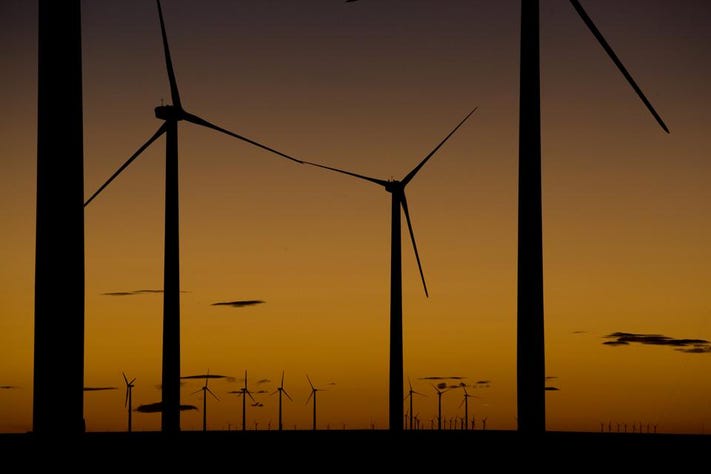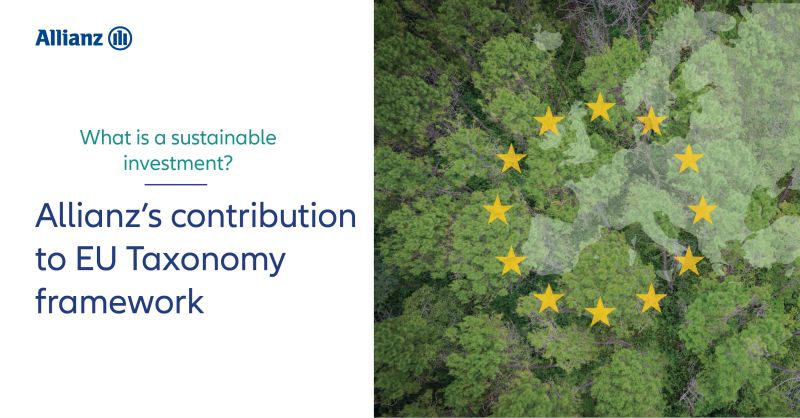Now is the time to accelerate the transition to renewable energy sources
Allianz SE

Günther Thallinger, an Allianz SE board member, recently spoke with noted American environmentalist and author Bill McKibben about the need for meaningful action to make the planet safer and more sustainable. They all agreed on the importance of accelerating the transition to renewable energy in order to avoid irreversible climate change.
As the unprovoked attack on Ukraine continues, despite the humanitarian disaster and the world's call for an end, the global economy's reliance on fossil fuels is being called into question even more.
The imperative to significantly reduce emissions of harmful climate gases in order to keep the world livable has now been given additional impetus by geopolitical developments, namely, to reduce or end reliance on dictatorships or authoritarian regimes as soon as possible. Allianz Board member Günther Thallinger and author Bill McKibben discuss what policymakers and the private sector must do now.
A "fortunate coincidence" "The world has been given a stark argument for the switch to renewables," said McKibben, founder of the climate campaign group 350.org and author of The End of Nature (1989). Although fossil fuels were identified as the source of the climate crisis decades ago, humanity has been painfully slow in transitioning to a low-carbon society."
Before the COVID-19 pandemic, fossil fuels still accounted for 84% of global primary energy consumption in 2019. However, as energy dependence increases, the geopolitical situation may provide a sense of urgency to accelerate the adoption of clean energy and explore new, alternative sources for fossil fuels.
“Scientists and the engineers have done their job – they've dropped the price of renewable energy 90% in the last decade,”
McKibben said. The challenge is now less technical than political. “The question is, how do we keep forcing this transition?” he added.
McKibben pondered how the different facts concerning climate change and the perils of dependency on petrostates could be fashioned into policy that grapples realistically with the need for fast action. There are two pressing timescales, he explained.
“For Europe, it means ensuring that there is energy to heat people's homes next winter. According to the IPCC , this decade is crucial for the planet: We have to cut emissions by 50% until 2030, which is only seven years and ten months from now.” He added. “I don't think we've dealt with these questions as seriously as we should in the past.”
"Scientists and the engineers have done their job – they've dropped the price of renewable energy 90 percent in the last decade."
Economists have long argued that a well-designed carbon tax is the most economically efficient way to reduce carbon emissions. McKibben believes that a carbon tax is unlikely to pass in the United States due to political obstacles. However, given the increasing urgency for action, it is more important to have strong governmental action behind a renewable energy buildout.
The AOA has urged governments to end subsidies that support fossil fuels, distort energy markets, and exacerbate the climate crisis. The organization supports programs to ensure a market-based carbon price, believing that the transition to a low-carbon, renewable energy-driven economy is hampered – if not made impossible – by fossil fuel companies not having to face the cost of not changing.
I completely agree that an economy based on renewable energy is more cost-effective and thus superior in competitive terms. The question is, how can this transformation be accelerated?
Günther Thallinger, Allianz SE board member
"I completely agree that an economy based on renewable energy is more cost-efficient and, thus, superior in competitive terms,"
Thallinger said. "The question is, how do we kickstart the acceleration required for this transformation?"
According to the International Energy Agency (IEA) and the Organization for Economic Cooperation and Development (OECD), 52 advanced and emerging economies accounted for roughly 90% of global fossil-fuel supplies from 2017 to 2019. The question is whether the current political environment allows these subsidies to be redirected to the renewable energy sector.
McKibben stated that politicians prefer "giving money to things rather than taking money away from things." He explained that with President Biden's signature climate legislation, Build Back Better, dead in the US Congress, the fallback has been to allocate $500 billion in tax credits for clean energy.
"In essence, that's a reward for doing the right thing." The US Senate is divided by a single vote. This would be a massive shift. And people are working extremely hard to make it happen. The key is to understand what is politically feasible at all times. We're in a period when political reality is more fluid than usual."
Rewriting our perception of what is possible The rate at which the price of renewables is falling is the most encouraging sign we have about our ability to mitigate climate change, according to McKibben, "because it's become clear that it's beginning to rewrite our sense of what is possible." According to a recent Oxford University study, every doubling of solar and wind generation capacity reduces the cost of generating energy by 30%, resulting in a 10% annual decrease.
Thallinger applauds such developments, but contends that government coordination is also required. This should create a level playing field on which individual asset managers or insurance companies can compete.
"You have a first-mover problem," McKibben replied. "In an ideal world, fully coordinated action would be the best possible outcome, and we'd all move quickly and smoothly to where we're going." But, in my experience, that is rarely the case. It takes courage to take the lead."
The science is clear: unless we dramatically transform this decade, we're screwed.
While understanding that no politician or CEO wants to move so far ahead that they lose their position, he emphasized a desperate need for action. “The science is clear that we're out of luck unless we dramatically transform this decade.”Günther Thallinger summarized that this was the role the AOA was undertaking. The members have committed to transition their portfolios to net-zero and delivered a clear framework to turn ambitious long-term commitments into interim 2025 and 2030 targets to at least halve their emissions compared to 2020. The AOA also aims to create a virtuous cycle between the private sector and governments. Engagement can and should include meaningful dialogue with legislators focused on the rapid implementation of climate policy. The same approach of the AOA is now being replicated in insurance and by other financial service providers.
Source: Allianz news






